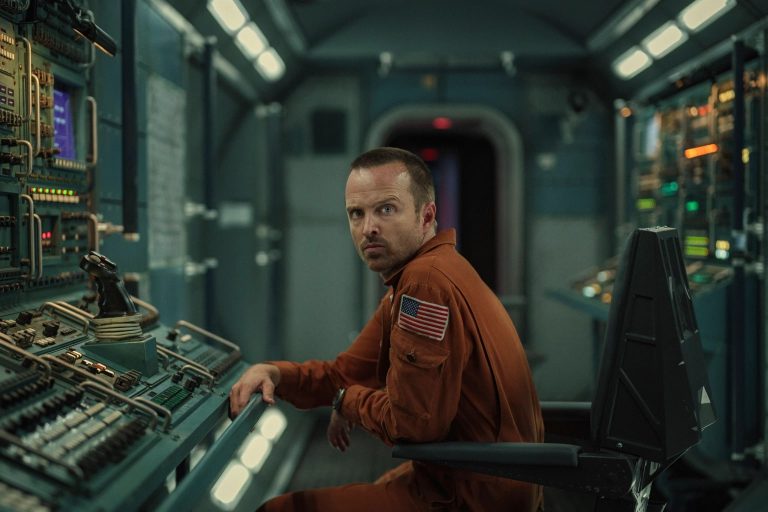A little over a year ago, I reviewed an Oscar-nominated short from Mexican-American screenwriter and director K.D. Dávila titled Please Hold, about an alternative (read: potential) future in which someone gets arrested by a drone for an undisclosed crime and placed in a fully-automated holding cell where a malfunctioning computer screen prevents him from communicating with his lawyer.
In my review, I wrote that Please Hold feels a lot like Black Mirror, and for good reason. Its central theme of humanity getting stuck in a trap of its own making has been part of the Netflix hit’s DNA from the very beginning, and is placed front and center in a new season that premiered on June 15 – four years after the previous one.
A lot has happened in the real world since then, both politically and technologically. Deep fakes of photo and video variety can now be used to fabricate convincing visual “evidence” for written misinformation on social media and beyond. Generative AI, chiefly ChatGPT, is automating the bottom tier of the white-collar job market. Netflix is no longer the only streaming service in town, and its ongoing war with HBO Max and Disney+ is driving media executives to make popular entertainment even more noxiously nefarious than it already was.
Since Black Mirror is, as its title suggests, a reflection of the real world, it should come as no surprise that many of these developments are featured in the new episodes. The first of these, “Joan is Awful,” follows a woman whose young, upwardly mobile existence falls apart when she discovers the streaming service Streamberry – which has the same logo style, font type, and intro as Netflix – has created a computer-generated show about her private life, something she unknowingly gave them legal permission to do when she signed up for a subscription.
In “Loch Henry,” an American film student travels to Scotland to meet her boyfriend’s mother. While there, she learns the town they live in used to be inhabited by a serial killer. Sensing a rare opportunity to make it in the industry, she convinces her boyfriend to help her make a true crime documentary about said killer, something he is reluctant to do given how personal and traumatic the topic is for him and his community.
“Beyond the Sea,” which stars Breaking Bad actor Aaron Paul, opens with what we believe are two fathers spending time with their wives and kids, but which actually turn out to be robots controlled by astronauts aboard a space shuttle so they can spend time with their loved ones during off hours. Tensions aboard the ship rise when one of them tragically loses both his family and his robot, leading the other (Paul) to share his robot – and, by extension, his family – to prevent his spiraling colleague from committing suicide.
The fourth episode of the season, “Mazey Day,” is less sci-fi and more supernatural, a genre Black Mirror has toyed with in the past but never embraced as openly as it does here. I’m not sure how I feel about it – part of the show’s appeal is that it’s rooted in hypothetical but still plausible reality. I don’t think it would ruin your experience if I spoil what kind of supernatural thing happens, but still I won’t, as it is only a minor detraction from what truly lies at the heart of the episode: the moral deplorability of paparazzi and public celebrity.
I haven’t yet seen the fifth episode – “Demon 79” – and thought it would be nice to leave that one a complete mystery for you, the reader. Its tagline promises a story about a meek sales assistant from 1979 who “must commit terrible acts to prevent disaster,” but that’s all I know. The premise sounds similar to an earlier episode, “Shut Up and Dance,” in which a teen played by Alex Lawther (The End of the Fucking World) must commit crimes to prevent an anonymous hacker from revealing that he secretly watches child pornography, being joined along the way by the actor who plays Bronn in Game of Thrones. Maybe it will be similar. Maybe it will not.
I’m willing to put money (not much, $5 or $10 tops) on the latter and that is because I have faith in Charlie Brooker. Brooker, in case you didn’t know, is the creator of Black Mirror. He’s also the sole writer – notwithstanding some co-credits here and there – of each and every one of the show’s 22 episodes, including the 2018 interactive special Bandersnatch.
Most of the screenwriters I like, I like because they have a distinctive voice. You do not need to spend a lot of time watching a movie written by Charlie Kaufman (I’m Thinking of Ending Things, Eternal Sunshine of the Spotless Mind) to recognize he wrote it. The same can be said about the Coen Brothers, Aaron Sorkin, or Phoebe Waller-Bridge, but not about Brooker. Normally, this would be a criticism. But in his case, it’s really a complement. Indeed, each chapter in the Black Mirror anthology has such a unique tone and voice you’d think they were written by completely different people. It’s Brooker’s versatility as a writer, not just his astuteness as an observer of the interplay between culture and machinery, that keeps his magnum opus feeling fresh.
Across six seasons, the only constant in Black Mirror is its darkness. Even when episodes end on a seemingly positive note, an underlying hint of melancholy remains present. When they end on a bad note, as they often do, they leave us feeling disturbed and depressed in a way few stories are able to, and that, too, tells us something about ourselves. Something we’d rather not acknowledge, but probably should.
